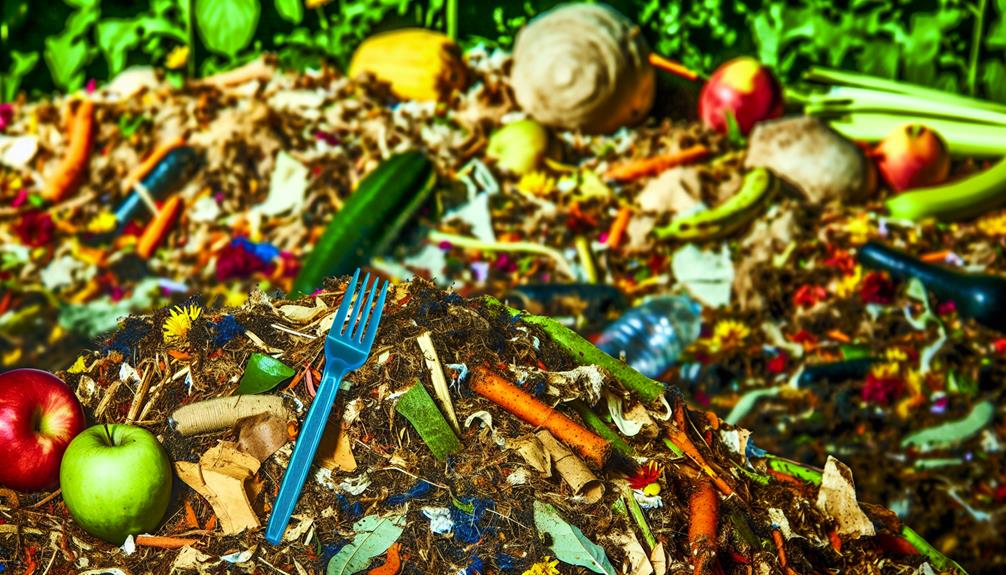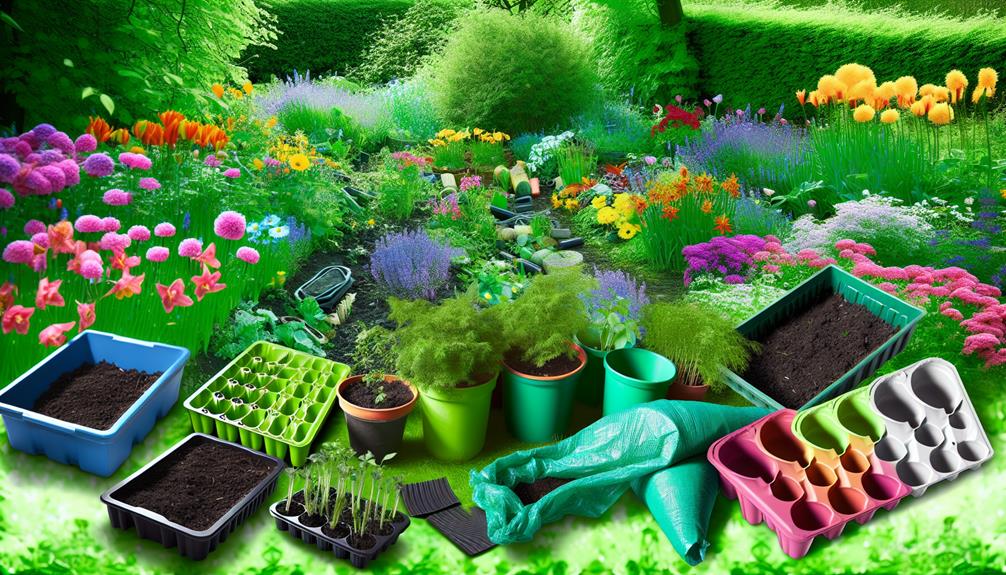

You can’t compost petroleum-based plastic because it doesn’t biodegrade, persisting in compost piles for years. These plastics, enhanced with additives for durability, resist microbial breakdown essential for composting. Unlike organic matter, they disrupt the compost pile’s balance and negatively impact its quality and plant health.
For a more sustainable option, consider using bioplastics made from renewable resources that are designed to biodegrade and compost effectively.
These alternatives help reduce plastic pollution and dependence on fossil fuels. Understanding the limitations of petroleum-based plastics in composting is crucial for effective waste management and a greener future. Keep exploring to discover eco-friendly alternatives.
Why are petroleum-based plastics so prevalent in our daily lives?
The answer lies in their unique polymer structure and the plastic additives used during production. Petroleum-based plastics, made from long chains of hydrocarbons, are incredibly versatile. Their polymer structure can be manipulated to create materials that are strong, flexible, transparent, or opaque, making them ideal for a wide range of applications.
You probably encounter these plastics everywhere—from the packaging on your groceries to the components in your electronics.
The plastic additives, such as stabilizers, plasticizers, and colorants, enhance these properties, making the plastics even more adaptable to various needs. These additives improve durability, flexibility, and aesthetics, ensuring the products meet specific requirements.
Understanding these aspects helps you see why petroleum-based plastics are so dominant. They’re not just convenient; they’re engineered to be integral to modern life.
When you grasp the complexity of their polymer structure and the role of plastic additives, it’s clear why replacing them is challenging. However, knowing this also equips you with the knowledge to seek and support more sustainable alternatives, fostering a sense of belonging in a community that values environmental responsibility.
Understanding the science of composting gives you the tools to turn organic waste into nutrient-rich soil. At its core, composting involves microbial breakdown, where microorganisms like bacteria and fungi decompose organic matter. These microbes consume waste, producing heat, carbon dioxide, and humus—a stable, organic material.
To start, you need a balanced mix of green (nitrogen-rich) and brown (carbon-rich) materials. Green materials include kitchen scraps and grass clippings, while brown materials consist of leaves and cardboard. The right balance fosters an efficient microbial breakdown process.
Next, manage the carbon cycle within your compost pile. Carbon is essential for microbial energy, while nitrogen is important for protein synthesis. A proper carbon-to-nitrogen (C:N) ratio, around 30:1, ensures an ideal environment for microbes. Turn the pile regularly to incorporate oxygen, which is necessary for aerobic decomposition.
Temperature is another critical factor. A well-maintained compost pile heats up due to microbial activity, ideally reaching 130-160°F. This temperature range accelerates decomposition and kills pathogens.
Also Read: Can You Compost Butter?
Plastics have a major impact on the environment, polluting oceans and landscapes while taking centuries to decompose. You’ve probably seen images of plastic waste floating in the sea or scattered across beaches. But it’s not just the visible litter that’s concerning; it’s the microplastic pollution that’s even more insidious.
Microplastics are tiny fragments that result from the breakdown of larger plastic items. These particles end up in waterways, soil, and even the air you breathe, posing serious risks to wildlife and human health.

Moreover, the production of plastics relies heavily on fossil fuels, playing a significant role in greenhouse gas emissions. Every time you see a plastic product, you’re looking at something that started as oil or natural gas. This reliance accelerates climate change and depletes non-renewable resources.
Reducing plastic use and finding sustainable alternatives can make a huge difference. By choosing products with minimal plastic packaging or opting for reusable items, you contribute to lessening the environmental burden.
Understanding the impact of plastics encourages you to adopt more eco-friendly habits and join a community committed to protecting our planet. Let’s take these small steps together for a greener future.
Composting petroleum-based plastics presents significant challenges due to their complex chemical structures and resistance to biodegradation. These plastics are designed to be durable, which means they don’t break down easily. Traditional composting methods simply aren’t enough to tackle these substances. They can persist in your compost pile for years without significant degradation.
One of the major composting challenges is the lack of microbial activity that can effectively break down petroleum-based plastics. Unlike organic matter, which decomposes through microbial processes, these plastics resist such natural breakdown. You might notice that even after months, these plastics remain largely unchanged, rendering your composting efforts ineffective.
Additionally, the presence of petroleum-based plastics in compost can contaminate the final product. This not only affects the quality of your compost but can also harm plants if used as a soil amendment. You’ll need to be vigilant about separating these plastics from organic waste to maintain a healthy composting environment.
Understanding the inherent challenges of plastic degradation is crucial. By acknowledging these obstacles, you can better manage your composting practices and contribute to a more sustainable approach to waste management.
Also Read: Can You Compost Canned Fruits?
When looking for more sustainable options, consider using bioplastics made from renewable resources like cornstarch or sugarcane. These plant based plastics are designed to break down more easily in the environment compared to traditional petroleum-based plastics. By choosing biodegradable packaging, you’re making a conscious effort to reduce your environmental footprint and contribute to a more sustainable future.

You’ve got a variety of options when it comes to plant based plastics. PLA (Polylactic Acid), derived from fermented plant starch like corn, is a popular choice. It’s suitable for a range of uses, from food packaging to disposable cutlery.
Another option is PHA (Polyhydroxyalkanoates), produced by microbial fermentation of sugars. PHA isn’t only biodegradable but also compostable under the right conditions.
Switching to these alternatives can make a significant impact. They not only reduce reliance on finite resources but also help in minimizing plastic pollution. When selecting products, look for certifications that indicate the packaging is truly biodegradable and compostable.
You’ll find petroleum-based plastics in everyday items like packaging materials and food containers. They’re essential for keeping products fresh and secure, making your daily life a bit easier. You’re part of a community that relies on them.
You might worry about toxin release when composting petroleum-based plastics. They can indeed release harmful substances, impacting the environment negatively. Sticking to compostable materials helps protect our planet and keeps our community eco-friendly.
To identify petroleum-based plastics, use identification methods like checking recycling codes. Look for codes 1, 2, 4, or 5. This helps you join others in making eco-friendly choices and reducing environmental impact.
You’re wondering if specific composting facilities accept petroleum-based plastics. Generally, they don’t due to limited industrial applications and biodegradation methods. Instead, explore facilities specializing in innovative recycling techniques to stay eco-friendly and community-minded.
No, compostable plastics don’t decompose at the same rate as organic matter. Biodegradable materials like food scraps break down faster. You’ll need to be patient, but rest assured, they’ll eventually decompose in a composting environment.
You can’t compost petroleum-based plastics because they don’t break down like organic materials. Instead, they persist in the environment, causing harm.
To reduce your impact, opt for biodegradable or compostable alternatives. Proper sorting and recycling can also help manage waste effectively.
Stay informed about materials and disposal methods to make eco-friendly choices. By making these small changes, you’ll contribute to a healthier planet.
